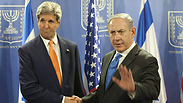
Arbitration by a dwindling empire
The Israeli-Palestinian peace process is in search of a responsible adult to guide it.
WASHINGTON - The US is no longer playing the role of the responsible adult in the bloodbath between Israel and Gaza.
While Secretary of State John Kerry may have arrived in Cairo with the best of diplomatic intentions, hopes for a ceasefire agreement soon shattered. The fault lies with the US, whose involvement in arbitrating the conflict has been minimal and detached, lacking the necessary creativity and strength to steer the parties toward peace.
Kerry should have led negotiations with the stick, making it clear that parties who refuse to now accept the proposed weeklong ceasefire will have to face the consequences later. But US influence in world affairs is dwindling, preventing Kerry from exercising such “tough love”. The empire is in decline, and its diplomatic word isn’t what it used to be.
The void left by the US pulled Ban Ki-moon into the limelight, with the parties receptive to his humanitarian ceasefire proposal. Kerry in the meantime flew to Paris to speak with the least relevant parties: European ministers and representatives from Qatar and Turkey. No Palestinian, Israeli or even Egyptian delegates were present. This latest round of negotiations rendered Kerry obsolete, irrelevant. He has been truly marginalized.
The failure of leadership on the Israeli side, just as on the Palestinian side, made the negotiating into a petty game dominated by greed, honor and madness. Meanwhile, the preventable bloodshed continues on both sides. Just months ago, Netanyahu turned his back on a peace agreement offered by the Palestinians, claiming that Mahmoud Abbas was "no partner", that his leadership was weak. And when a Palestinian unity government with Hamas was formed, Netanyahu decisively cut off diplomatic options. The American peace delegation was dismissed, and Kerry turned his attention to pressing affairs elsewhere.
The only one who tried to convince Netanyahu to cooperate with Abbas’s new government was Tony Blair, arguing that Hamas’s involvement offered a unique opportunity to reach full-fledged peace agreement. It marked a moment where Hamas could transform from being a terror group to a non-violent political movement.
Netanyahu missed out, and now he can only pray the opportunity presents itself once again. He didn’t want to meet Abbas while the two had Kerry’s attention. Now he yearns for Abbas to save the day and offer to take control of passage in Gaza.
The recognition that the Abbas rule is preferable to Haniyeh and Mashal is by now ingrained in all the Israeli leadership. This recognition should now translate into action and be used as basis for a sustainable political solution.
At this stage, Israel is still backed by world leaders, but it won't be for long. The idea that Israel can do as it pleases while receiving only praise from world leadership is both scary and dangerous. Force can only go so far, and in a war against terror there are no clear victors. If Kerry were to recall fighting the Viet Cong in the Vietnam War and the bitter stain the retreat from Saigon left on the American psyche, he’d likely agree.
If Israel does not offer a prompt political solution, creating a neighboring Palestinian state, the region will remain in a dire and hopeless condition. This war cannot end in victory, only in rubble and bloodshed.
The situation calls for a mature political strategy, aided by a responsible adult – a role the US failed to play – to help carry it through. We need smart leadership, not more smart bombs that will ultimately backfire in the long haul.










